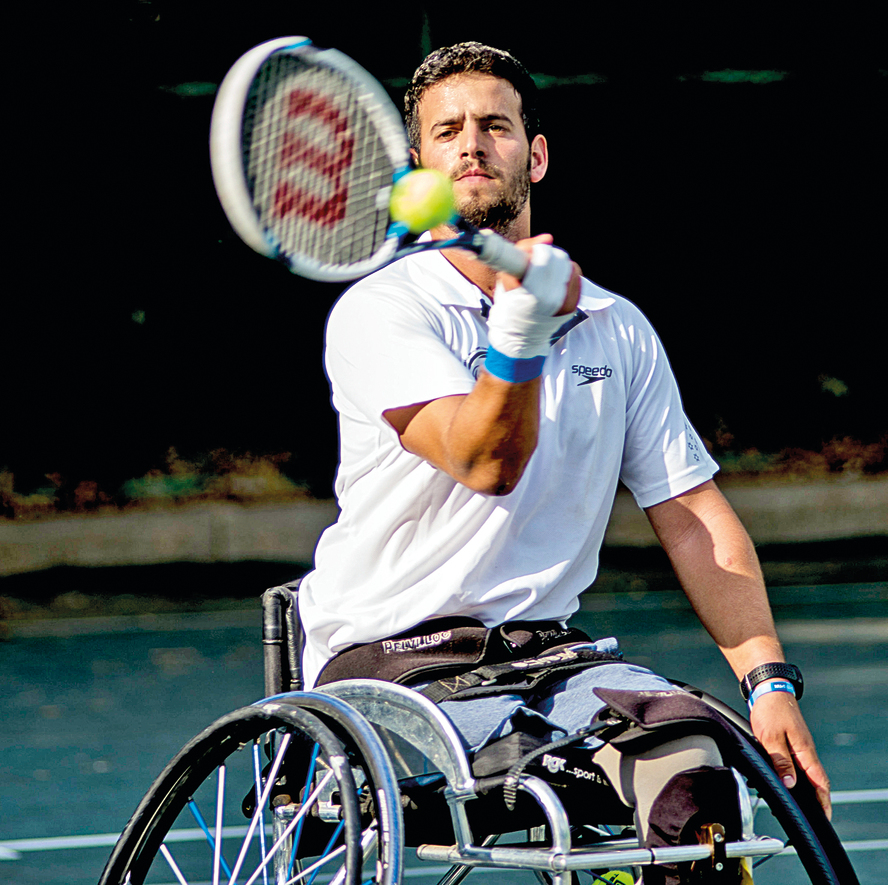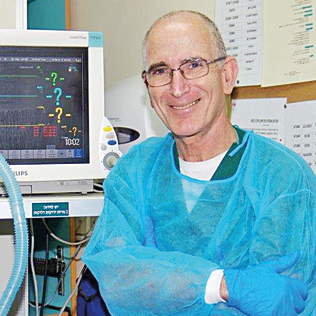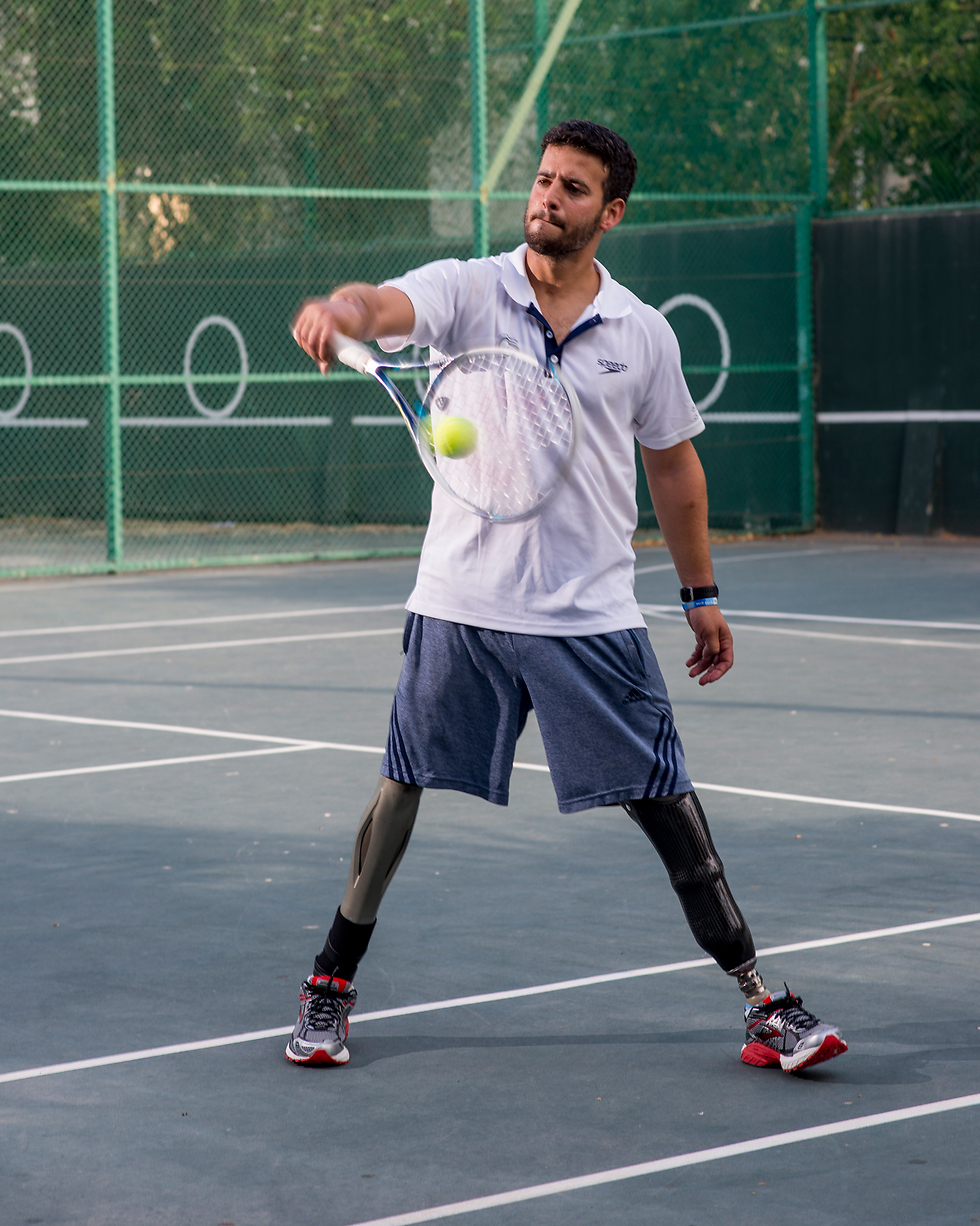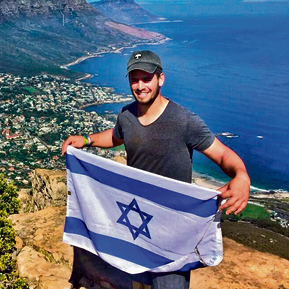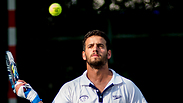
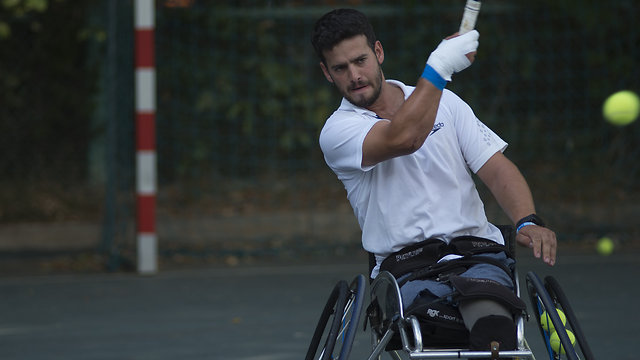
A baller against all odds
Itay Erenlib lost both of his legs and was seriously injured in his arm in an IED explosion in Nablus during his IDF service. After a miraculous recovery that amazed all of his doctors, Erenlib returned to the army to finish his service, got a degree in life sciences and is now training to play wheelchair tennis at the Rio Paralympic Games next month.
Few are the two-legged people who live their lives like Itay Erenlib does. Fewer are those who only have one leg, and can do what he does. Except that he is living, perhaps more so than anyone else, with two prosthetic legs: One over the knee, the other in the ankle-area.
"I have a room full of legs: For climbing, running, swimming..." Erenlib jokes, as he removes his prosthetics to sit comfortably in the wheelchair with which he plays tennis.
Ever since he nearly lost his life in an IED explosion in Nablus, leaving part of his body there, he has mananged to repeatedly amaze his doctors.
"I guess the doctors, occupational therapists and physiotherapists in this field are the most pessimistic people in the world," he says, amused.
"He has a three-to-five percent chance of living," the pessimist physicians told Erenlib's parents. "He wouldn't make it out of the ICU," they informed. "You won't be able to walk, and certainly not without crutches," the doctors went on to assess.
Despite this, Erenlib is very much alive: walking, running, climbing mountains, having fun, working, and in about two weeks—he will also represent Israel in the Paralympics in Rio and try to win a medal in wheelchair tennis. This, too, is seemingly an almost impossible challenge. But those who know him and the incredible journey he's had won't dare bet against him.
'Closer to death than to life'
Captain (res.) Itay Erenlib, 31, was born and raised in Petah Tikva. He is the eldest child of Dov, who worked at Yedioth Ahronoth's Distribution Department, and Sherry, who works as a teacher's assistant in special education.
In his teen years, he played a little bit of basketball for Maccabi Petah Tikva, and in 2003 he enlisted in the IDF, joining Sayeret Tzanhanim (paratroopers commando unit), where his father also served. There, he also became an officer, and fought in the Second Lebanon War as a team commander.
After the war, he was transferred and commander over another team, and in July 2007 he was deployed to Nablus.
"We were supposed to enter an ambush inside the Nablus Casbah, locate militants and find explosives labs," he recounts. "Before leaving our vehicle, we sent a dog twice to sniff around and make sure the alley was clear. When the dog returned, we started moving towards the ambush and as soon as we got there, an explosive was set off. We were all wounded: Lev was moderately wounded, Amos and Yishai lightly, and I was critically hurt."
Surprisingly, Erenlib did not lose consciousness. "The doctors couldn't figure out how that happened, either," he says. "I lost one leg on the spot, and the other stayed with me for another month in the hospital."
Do you remember these moments?
"Yes, I was fully conscious. I remember talking to the doctor, asking him what was the situation of my soldiers. When the battalion commander, Yaron Finkelman (currently the commander of the Givati Brigade), and the company commander showed up, I told them: 'You cover upstairs, I'll cover here.' I guess I wasn't aware of the injury I suffered and I was more interested in what happened to the guys who were with me. I was acting as if we had just finished a training exercise, when you check the situation of the people in your team: 'Number one is fine, number two is fine, number three is fine.' When the company commander showed up, he asked me 'Erenlib, what about you?' And I said, 'I'm 100 percent' I was busy with the mission."
At the hospital, he was sedated, and for two months he fought for his life. "I was closer to death than to life," he says, as if it was a thing of no importance. "Everyone here can be credited with the fact I have the privilege of being here now: Liron, the doctor in the field; the medic Ziv, who put the arterial tourniquet on me; and most importantly the doctor who treated me—and became a sort of a second father—the late Dr. Danny Simon, from the Tel HaShomer Medical Center."
You woke up two months later, and then what?
"When I opened my eyes, my mom, out of excitement, started screaming and ran outside. She couldn't believe I was calling her 'Mom' again. My dad asked me if I was still tired. I said I was. I didn't know I had been sleeping for two months. All I knew were the dreams I had, some related or close to reality. I was heavily sedated."
And you woke up with no legs, and a hand that doesn't function.
"As far as I was concerned, I had woken up to a different reality, one I had to deal with. After all, I am still the same person, with only a slight change. Listen, I realized I had been injured, that something serious had happened to me. But I also knew that you could and should deal with any difficulty. Despite the pessimism from the doctors, I said, 'Okay, this is what they're saying. Now is my test with myself. I want to be back at health level 97 (the IDF's highest ranking for top health), no less.'"
Back to Nablus
Erenlib wasn't joking when he was talking about retaining health level 97. Half a year after his injury, he amazed his doctors—by walking. A few months later he was back in uniform. At first, he returned to the paratroopers, and then he served with other units. As part of his service, he also returned to Nablus, where he was wounded.
"The first powerful moment I remember from my rehabilitation was making a tree from ceramics, for Dr. Simon, who is a very special man," Erenlib says. "Over the tree I put a worm that represents life—as they say, 'man is like the tree of the field'—and added the quote: 'Though I walk through the valley of the shadow of death, I will fear no evil, for Thou art with me.' I told myself that when I can walk again and use my hand, and when I can walk the 1.5 kilometers from the rehab center to the trauma center at Tel HaShomer, I'll give him this tribute. And so it was. It was very meaningful to both of us."
Is this something you ever believed would happen, when you woke up and realized what had happened?
"Mentally, they always say: 'Don't think about the end of the journey, focus on the next step, what you are doing tomorrow morning.' So the first step was to be able to stand up. The second step was to be able to balance on one leg, and then to be able to walk. Then, walk for half a kilometer, a kilometer, and two kilometers. And then—running, climbing, going down the stairs and any other possible step."
What did the doctors say about this?
"That I was crazy. I think every time, they were a little more amazed—but I wasn't. Everything I wanted to do—I did. Even if it wasn't easy. You fall, get up, fall again, and get up again, until you succeed. I believe that if a person wants to do something—any person, and any action—he can do it. I believe everyone has the willpower. The question is how and when he uses it, and if he believes in himself."
Not everyone goes through the same difficulties as you did.
"That's the message I put across in lectures to children, young people before the draft, soldiers, and adults. I may have dealt with something difficult in live—or rather experienced; I call it an experience, because it has a better connotation—but everyone deals with something that to them is unique: An English test at school, a bruise, a breakup, a bad date. The question is how you deal with that difficulty, and how long it takes you. It's important to keep in mind that anything can become a goal to strive for, and there is no goal that cannot be achieved. You might fail on the way—but don't stop smiling, learn from your failure, believe, and next time you'll succeed."
The crazy game of tennis
Itay spends almost every free moment he has on the tennis court or in fitness training: Working on another move, improving his serve, his forehand and backhand shots, his speed and his response time. It is likely that tennis also played a part in his miraculous recovery, and his attitude of a winner.
"Before tennis, I tried swimming, running, climbing, table tennis and basketball. And then I did a trial tennis training session and fell in love," Erenlib says, delivering a stroke and then reprimanding himself for what he saw as poor defensive shot. "This is a completely crazy game, and the most important thing about it is staying sharp and focused."
And unlike team sports, you are only dependent upon yourself.
"This way, I focus on myself, my abilities, and not in my rival's abilities—except for making tactical modifications (to my game play). I focus on me, my energies, I encourage myself."
Does it also help you in everyday life?
"Yes, I learned how to be positive. In life, not everything we come across is positive, but you learn something from anything—even from the negative."
What's positive about your injury?
Erenlib laughs. It appears he's heard this question one too many times. "Look, at first, I wasn't being positive," he admits. "But after about four months, I realized (something). Primarily, I learned who are the people truly close to me—my friends and my amazing family, thanks to whom I'm here. They still support me, no matter if I win or lose. It's a great privilege for any person to know who the people who truly love him are, those who will truly be there for him."
Are there those who would abandon people at such moments?
"At the end of the day, life is not always good. There are crises and health problems. You mature as the years go by. We won't always be at the height of our physical and mental abilities, and in those moments, when you're down, that is when friendship is measured. Those who stay by your side in moments like these are true friends, people you'd want to stay close to, those you could trust."
In the time that has passed since he was officially released from the IDF—merely four years ago—Erenlib has finished a BA in life sciences. He dreams of returning to school after the Paralympics and finishing a degree in medicine.
"I admire the late Dr. Simon and the people who worked with him so I could live today," he says. "That is why I studied for a paramedical degree. We'll see what the future holds after the games."
What options are you considering?
"I want to do things that have to do with saving lives or security."
Any plans to return to the IDF?
"I don't know, maybe. Anything could happen."
The prostheses as shoes
We meet at Beit Halochem in Tel Aviv, a center built for disabled IDF veterans. The massive complex includes a multipurpose gymnasium, classrooms, treatment rooms, rest accommodations, culture halls, cafeteria, massage and hydrotherapy unit, shooting gallery and 350-seat auditorium.
Erenlib receives at the center both support and conditions fit for a professional athlete. He has a regular tennis coach, Nimrod Bichler; tactics coach Ronen Morely; fitness trainer Yuval Luthbeck; mental coach Yoel Abarbech; "and the agent from here, Merav Bushari," he adds.
"There are a lot of people who surround me, expecting and waiting: Beit Halochem, the National Paralympic Committee, the Toto Winner (sports betting pools). There is support. I'm very proud to be representing the State of Israel. The most important reason to why I returned to the military is the desire and the belief that it is a privilege to contribute to the country, and if I am given the opportunity to represent Israel in the Paralympic Games—I'll grab it with both hands and make the most of it."
Even though among the general public, even if you win a medal, it's doubtful you'll become a household name. And it's likely sponsors won't be knocking down your door, either.
"Look, I'm a Paralympic athlete, and I work very hard—at least as hard as any Olympic athlete, if not more. I train three times a day, dedicate my life to it. We receive some support, but there's still a way to go."
Did you watch the Olympics?
"Yes, I was an ardent viewer."
How did you feel about the treatment to the Israeli delegation?
"People need to remember that every athlete have been burning the midnight oil for their own ends. You have to remember how much work they put into it. Athletes always aspire to succeed, certainly when we're representing the country and going there with the Israeli flag. Forget the medals, the fact these athlete got to the Olympics already says they're among the best in the world in their field—and more power to them for that. Any athlete that gets there has expectations of himself to reach the top. I haven't met an athlete yet who says 'Okay, I came here, I might make it to the final, I might not.' I always want to get as far as I can, and as far as possible."
How far can you get?
"As far as I'm concerned, I go there to make the best of it. Of course the goal is to get as far as possible. I've always aspired to excel everything—and the same goes for Rio. I come to give everything I have, and that is what I've been working towards for a long time."
He is ranked fifth in the world, with four strong tennis players ahead of him. He will have to defeat at least one of them to win a medal.
"That's the money time," he says. "And if you come with positivity and the right energy and you're prepared for this competition, you can probably make it happen."
In Rio, Erenlib will compete in the Quad category (the highest disability rate) in both singles and pairs with veteran tennis player Shraga Weinberg. Because his right hand was also injured by the IED, he has to tie the tennis racquet to his hand with duck tape.
"It very much limits his movement," says coach Nimrod Bichler, "but on the other hand it ensures the racquet won't fly out of his hand, which is something that could happen when the hand is not strong enough."
"At first, I couldn't use my hand at all," Erenlib notes, "and I was able to return it to almost-maximal functionality."
Erenlib gets up from his wheelchair for a few minutes to show that he could play standing up as well. After a few failed hits on my part, I admit defeat. Erenlib, it appears, is amused by my poor physical shape.
"I don't feel the disability in my daily life," he says. "I live exactly like you, or anyone else: Go to the pub, travel, work."
Are there still moments in which you think of what life could've been like?
"No. Enough, that's over with. Just like you put on shoes, I put on the prostheses. These are my shoes."
Where is this attitude coming from?
"I do everything in life at 200 percent. I always demand the most of myself, and beyond. Then, when you examine your own performance, you go over every step. If you weren't good enough, and didn't invest enough in it—you tell yourself 'Shame, I blew it.' But if you know you gave a lot of yourself—you're at peace with yourself. To me, personally, this is very important. And the most important thing is the willpower that urges me on in every challenge and every activity."
You really are the Usain Bolt of dealing with difficulties.
"Not Usain Bolt. I don't like his arrogance. I hate arrogant people. If he had humility, he might've been able to be a role model. I believe there's strength in humility, like Rafael Nadal. To me, he is a role model in his game."















